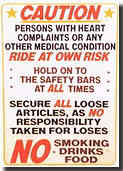Friday, March 25, 2011
The Triangle Factory Fire
100 years ago today:
Is everything different now? Don't be naive. In 1995, my employer at a retail store was hit with $30,000 in local & OSHA fines for unsafe conditions & other workplace violations, many of which were obvious to shoppers. We knew about them. There had been injuries management covered up by quietly making deals to pay every bill. Happened to me when I dropped something on my foot: Go to the Care Center, we'll have someone drive you, send us the bill, take the rest of today & tomorrow off even if it's not serious, won't count as sick days. Someone finally tattled. Stock piled so high on shelves that it blocked sprinklers, & those shelf units themselves unsafe - some had collapsed, an employee's arm was broken. Emergency exit doors didn't open or were blocked. In the stockrooms, boxes of old paints & damaged goods were heaped ceiling high. Shortage of safe ladders. The employee bathrooms were a disgrace. & this was a "legal" operation, not a sweatshop. A fire at that store during working hours would have been tragic. There plenty of sweatshops in our cities still. Small businesses - the backbone of American economy we're told - they're the worst offenders. Drive the pot-holed streets next to the railroads & you catch glimpses of hellholes through open doors, the telltale beat-up bicycles of undocumented aliens parked outside them.
"If a nation expects to be ignorant and free, in a state of civilization, it expects what never was and never will be." Thomas Jefferson
Near closing time on Saturday afternoon, March 25, 1911, a fire broke out on the top floors of the Asch Building in the Triangle Waist Company. Within minutes, the quiet spring afternoon erupted into madness, a terrifying moment in time, disrupting forever the lives of young workers. By the time the fire was over, 146 of the 500 employees had died. The survivors were left to live and relive those agonizing moments. The victims and their families, the people passing by who witnessed the desperate leaps from ninth floor windows, and the City of New York would never be the same.There are many online resources to learn about this tragedy, the Cornell University Exhibit is a good one.
Many of the Triangle factory workers were women, some as young as 14 years old. They were, for the most part, recent Italian and European Jewish immigrants who had come to the United States with their families to seek a better life. Instead, they faced lives of grinding poverty and horrifying working conditions. As recent immigrants struggling with a new language and culture, the working poor were ready victims for the factory owners. For these workers, speaking out could end with the loss of desperately needed jobs, a prospect that forced them to endure personal indignities and severe exploitation. Some turned to labor unions to speak for them; many more struggled alone. The Triangle Factory was a non-union shop, although some of its workers had joined the International Ladies' Garment Workers' Union.
Is everything different now? Don't be naive. In 1995, my employer at a retail store was hit with $30,000 in local & OSHA fines for unsafe conditions & other workplace violations, many of which were obvious to shoppers. We knew about them. There had been injuries management covered up by quietly making deals to pay every bill. Happened to me when I dropped something on my foot: Go to the Care Center, we'll have someone drive you, send us the bill, take the rest of today & tomorrow off even if it's not serious, won't count as sick days. Someone finally tattled. Stock piled so high on shelves that it blocked sprinklers, & those shelf units themselves unsafe - some had collapsed, an employee's arm was broken. Emergency exit doors didn't open or were blocked. In the stockrooms, boxes of old paints & damaged goods were heaped ceiling high. Shortage of safe ladders. The employee bathrooms were a disgrace. & this was a "legal" operation, not a sweatshop. A fire at that store during working hours would have been tragic. There plenty of sweatshops in our cities still. Small businesses - the backbone of American economy we're told - they're the worst offenders. Drive the pot-holed streets next to the railroads & you catch glimpses of hellholes through open doors, the telltale beat-up bicycles of undocumented aliens parked outside them.














